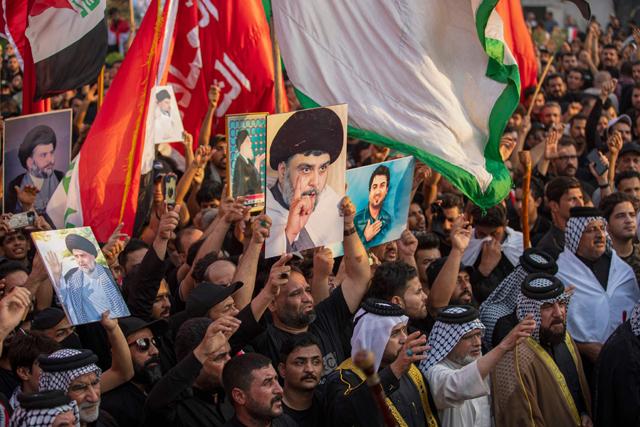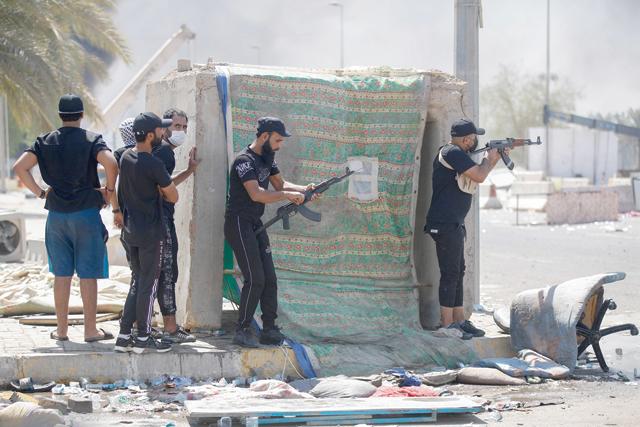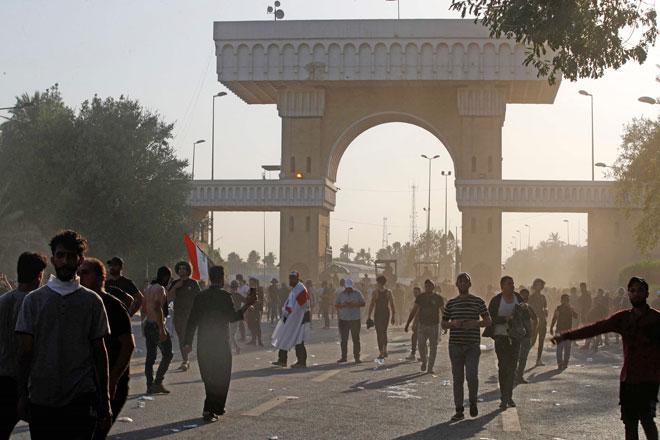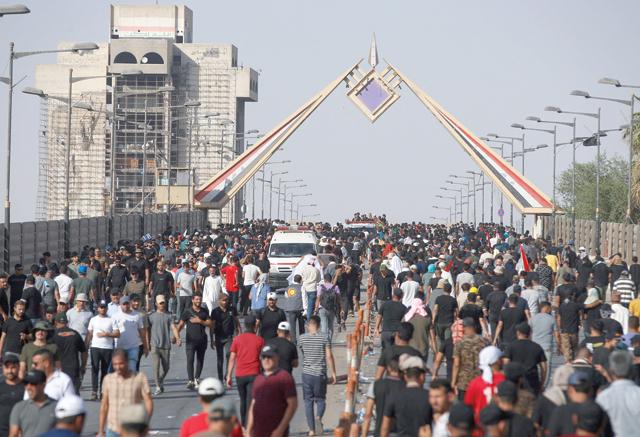You are here
Iraq tensions soar as protesters rally against parliament occupation
By AFP - Aug 02,2022 - Last updated at Aug 02,2022

Supporters of Iraqi cleric Moqtada Sadr lift placards depicting him during a rally protesting a rival political bloc's nomination for prime minister in the southern Iraqi city of Basra on Monday (AFP photo)
BAGHDAD — Thousands of Iraqis took to the streets of Baghdad Monday in counter-protests as rival supporters of Shiite Muslim cleric Moqtada Sadr extended their occupation of parliament into a third day.
Almost 10 months after Iraqis went to the polls, a political standoff pits two key factions of the Shiite political scene, between the populist Sadr with a devoted following of millions, and the powerful pro-Iran Coordination Framework.
"The people will not allow a coup," read placards held by supporters of the Coordination Framework as they gathered on a main street leading to the Green Zone, the home of parliament, which Sadr's supporters have been occupying since Saturday.
“It is the parliament of the people, of all Iraqis, not the parliament of a select group”, said 25-year-old protester Ahmed Ali, condemning “the storming” of government institutions.
Police fired water cannon at crowds in a bid to prevent them from crossing a bridge leading to the Green Zone, inside which thousands of Sadr supporters maintained their protests, waving flags and carrying placards of their leader.
Sadr’s supporters on Saturday breached the normally high-security Green Zone — also home to government buildings and embassies — in protest at a prime ministerial nomination by the Coordination Framework.
‘Defend the state’
Followers of the Coordination Framework urged supporters not to enter the Green Zone, saying their objective was to “defend the state and its legitimacy”.
After some two hours, the counter-demonstration announced they were dispersing.
“They wanted to show their political strength, to show that they too have a base that can take over the Iraqi street,” said political scientist Ihsan Al Shammari, from the University of Baghdad.
In multiconfessional and multiethnic Iraq, government formation has involved complex negotiations since a 2003 US-led invasion toppled Saddam Hussein.
In this case, the protracted political deadlock has left the country without a government, a new prime minister or a new president.
Sadr’s massive mobilisation of supporters in recent weeks has underscored the political clout of the firebrand preacher.
The Coordination Framework alliance includes lawmakers from the party of Sadr’s longtime foe, ex-prime minister Nuri Al Maliki.
It also represents the powerful pro-Iran former paramilitary alliance Hashed Al Shaabi, now integrated into the regular forces.
Hadi Al Ameri, who heads a faction of the Hashed, repeated a call Monday for “constructive dialogue” and warned against “an atmosphere of media escalation, sparked by statements and counter-statements calling for mass mobilisations that could get out of control and lead to violence”.
Iranian foreign ministry spokesman Nasser Kanani said Tehran respects “the choice of the Iraqi people”, and that “dialogue is the best way to solve the internal problems of Iraq”.
‘Government of the corrupt’
Sadr’s 73 lawmakers had made up the biggest group of parliament’s 329 lawmakers, but they were unable to cobble together a government.
In June they quit, a move that made their pro-Iran rivals the largest bloc in the legislature.
But the Sadrist camp was outraged by the Coordination Framework’s recent nomination of former minister Mohammed Shia Al Sudani for premier, prompting them to occupy parliament.
On Sunday, the mercurial Sadr called on “everyone... to support the reformist revolutionaries”.
The Coordination Framework described the appeal as “a call for a coup against the people, the state and its institutions”.
Followers of Sadr also held rallies in the southern cities of Basra, Kut and Nassiriya on Monday.
“Here are the soldiers of the sons of the sayyed,” Sadr’s supporters shouted in the parliament’s entrance hall, using an honorific reference to the preacher, who wears a black turban symbolic of a descendant of the Prophet Mohammed.
“We want to get rid of the government of the corrupt,” said protester Zaher Al Atabi. “From 2003 until now, those who have run the country have done nothing to develop public services, no health system, no education.”
But while the cleric’s supporters see him as cracking down on graft, Sadrist supporters hold posts at the highest levels of government ministries — and opponents accuse them of being just as corrupt as Iraq’s other political forces.
Related Articles
BAGHDAD — Iraqi supporters of powerful cleric Moqtada Sadr began withdrawing Tuesday from Baghdad's Green Zone after he demanded fighting en
BAGHDAD — Eight protesters were killed and Iraq declared a nationwide curfew after supporters of Moqtada Sadr stormed the government palace
BAGHDAD — Supporters of powerful Iraqi cleric Moqtada Sadr penetrated Baghdad's heavily fortified Green Zone on Saturday, occupying parliame



















